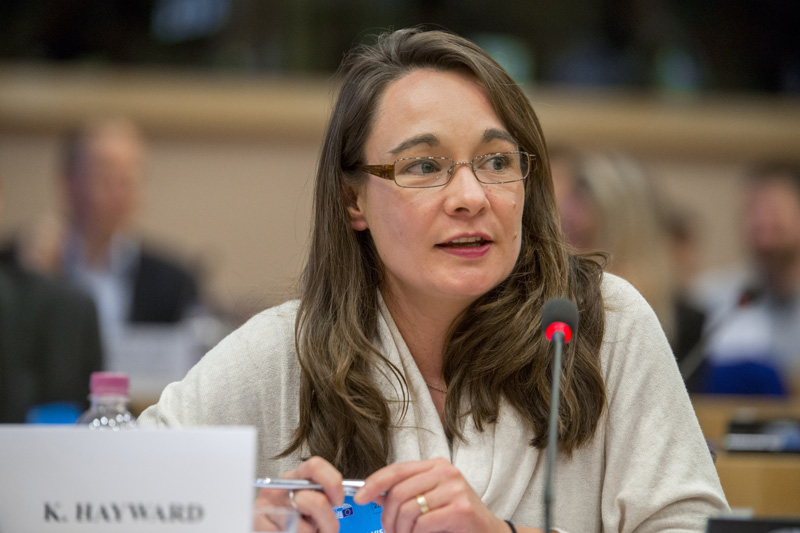Protocol/Windsor Framework crucial for voting decisions in the General Election in Northern Ireland
A new report from Queen’s reveals that for almost two-thirds of voters in Northern Ireland (NI) a candidate’s stance on the Protocol/Windsor Framework will be a deciding factor in their voting decision for the upcoming UK General Election.

One third (33%) will only vote for candidates supportive of the Protocol/ Windsor Framework, while 30% will only vote for candidates who are critical of it. 37% say a candidate’s position on the matter will not determine whether they vote for them.
This report is the eleventh in the ‘Testing the Temperature’ series on NI voters views on Brexit and the Protocol/Windsor Framework produced as part of a four-year project funded by the Economic and Social Research Council (ESRC), part of UK Research and Innovation (UKRI).
Speaking about the latest findings, Principal Investigator, Professor David Phinnemore from the School of History, Anthropology, Philosophy and Politics at Queen’s said: “The Protocol/Windsor Framework clearly matters for how most voters will vote in the upcoming General Election. And most are clear on what they want to see from a new government. Despite a near equal split in terms of voting for candidates who are critical or supportive of the Protocol/Windsor Framework there is majority support among nationalists, neithers and unionists for a closer UK-EU relationship provided it reduces constraints on the movement of goods between GB and Northern Ireland. And most voters would prefer pragmatism rather than principle determining whether the UK signs up for regulatory alignment with the EU. Whether a new government delivers, remains to be seen.”
Co-Investigator, Professor Katy Hayward from the School of Social Sciences, Education and Social Work at Queen’s commented: “While a third of voters will only vote for candidates who support the Windsor Framework, the data suggests that the Windsor Framework itself is not a priority issue for such voters. In contrast, it seems that most of the 30% of respondents who would only vote for candidates opposed to the Windsor Framework see it as a vital issue of concern. In and of itself, this points to a new tension over the Windsor Framework for NI politicians to navigate. This tension is now perhaps not so much about its existence or its contents or implications, but about whether people wish to continue debating it at all. This is not new in NI, of course (as opponents of the 1998 Agreement would remind us), but it does suggest that resistance to the Windsor Framework will remain a live feature in NI politics even as the majority wish to ‘move on’.”
Other key findings include:
- 74% of 'strongly unionist' respondents will only vote for candidates critical of the Protocol/Windsor Framework, while the majority of nationalists will vote for supportive candidates. Slight unionists are evenly split (21% for critical candidates, 21% for supportive candidates).
- Despite the slight decline in support from unionists towards the Windsor Framework in recent months, views on the Democratic Consent Vote remain stable. 57% of voters want MLAs later this year in their ‘democratic consent’ vote to vote in favour of the continued application of Articles 5-10 of the Protocol/Windsor Framework; 32% are opposed (the second-lowest proportion to date).
- More voters now see the Protocol/Windsor Framework as negatively impacting Northern Ireland's constitutional place in the UK (48% negative vs. 22% positive) and in the UK internal market (42% negative impact vs. 33% positive impact). This gap has widened since the February 2024 poll following the Safeguarding the Union deal which sought to offer reassurance on those points.
- The rise in wariness towards the Windsor Framework over the last three months within unionism may be related to the fact that 57% believe the Safeguarding the Union deal was oversold, with only 16% disagreeing. This sentiment is shared by 80% of 'strongly unionist' respondents.
- 75% believe the UK and EU should pursue closer relations under the Trade and Cooperation Agreement (TCA) to minimise formalities, checks, and controls on goods moving from Great Britain to Northern Ireland and the EU market. This includes a majority across unionist, nationalist, and 'neither' communities.
- 58% believe pragmatism, rather than principle (21%), should guide the UK's decision on whether to follow EU rules as part of a closer relationship with the EU.
- 58% expect a new UK government after the General Election to pursue relations with the EU that are beneficial to Northern Ireland.
This latest poll (using a weighted sample of 1,016 respondents from across Northern Ireland) was conducted by LucidTalk for Queen’s on 31 May – 3 June 2024, with the survey taking place just a few days after Prime Minister Rishi Sunak called a UK General Election to be held on 4 July 2024.
For the full report and findings, please visit https://www.qub.ac.uk/sites/post-brexit-governance-ni/ProjectPublications/OpinionPolling/ and follow on X: @PostBrexitGovNI.
Featured Expert


Media
Media enquiries to Zara McBrearty at Queen’s Communications Office on email: z.mcbrearty@qub.ac.uk and Mob: 07795676858